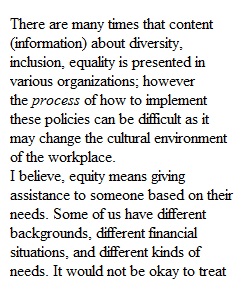


Q So I realize I posted the discussions out of order...So reflect back on your discussions about next steps and life application. During those discussions, you explored your thinking about next steps that can be taken as individuals, as a community, and as a society. As a class, you came up with some great ideas that I added to my growing list from semester to semester of ideas that students considered. Also, you considered simple ways that you could apply some steps in your own way and safely apply multicultural competence to your own career paths. As you know! I am all about process! There are many times that content (information) about diversity, inclusion, equality is presented in various organizations; however the process of how to implement these policies can be difficult as it may change the cultural environment of the workplace. As a person who actively lives by the motto of 'walk the walk, not the talk,' I am constantly challenged on how to implement multiculturally competent strategies and processes and procedures within my practice, community work, teaching, and life in general. That is my passion so I do understand that it may not be each of yours; but as a requirement of this course, I would like for you to think about ways in which multicultural competence can be promoted in workplaces and graduate training opportunities that you may encounter. Now on to the long contextual set up for your prompts....
Q Each group talked a lot about the ideal of equality...fairness...equal treatment. Thus, I would like to prick your brains a little more... As mentioned throughout this course...Culture is complex...rigid yet ever changing all at the same time! Therefore, we must be explorative, constructively critical and culturally responsive to the intracultural experiences of groups. Equality means that every person receives the same rights and treatment no matter their differences. It's the idea that the actual differences don't really matter, but that we should all be treated the exact same. Let's think about this example, Molly and Marissa are gifted children in the 3rd grade and are neighbors. Molly speaks standard English and lives with her single father (business manager) and 3 brothers. They value competition as well as team work and independence. Marisa lives with her mother (professor) and father (engineer) who speak fluent Italian. Marisa's family moved to the States 6 months ago as her mother obtained a job as an world language instructor at a prestigious university. Although her mother speaks fluent English at work; she mainly speaks Italian in the home. Marisa, herself is exposed to both languages but not quite bilingual.
Q Molly and Marisa are placed in the same English Language class and Mathematics course. They receive the same curriculum of work and have access to the same teachers who have been trained extensively in gifted education. In an equal opportunity model, Molly does well in her academic environment; whereas, Marisa struggles. Marisa is no less gifted than Molly; however, due to the cultural environment of the school which promotes equality, there is some oversight on how to best support Marisa and Molly in demonstrating their best work. With the use of additional supports, such as a separate language specialist, academic support, and social engagement and enrichment exercises, Marisa is more likely to demonstrate her gifted abilities as well as acquire new skills. Though Molly is proficient in school, with the use of additional supports such as extra time/tutorials on homework due to limited home time review, Molly is more likely to enhance her skills. However...although Molly could use further support to enrich her learning, the current academic environment does not limit her success within her current level of support.
Q Marcus, on the other hand, has two affluent parents and is gifted. He thrives in the academic environment without any needs for additional services. Models of equity suggest that supports are given to help individual gain access to the same opportunities, treatment, and rights. Equity is at times viewed negatively by dominant society as the use of additional supports may appear as a "help out" or give a "hand out" within a culture of competition. So let's talk about it! What are your thoughts about use of supports for individuals from different backgrounds. Does this "cheat" individuals in the dominant culture? How can equality erroneously lead us to believe that individuals with diverse backgrounds have lower abilities in the classroom or on the workforce? How much support is too much support? Will this shift the workforce? What are the benefits/costs of an equitable system? Who decides who receives which services? Who pays for these services? How does equality impact access to care and achievement gaps?
Q These are tough questions that are used to prompt your thoughts and discussion. As you think through your answers, provide your response, and remember to continue to keep your groupmates safe. Openly listen to responses that may differ from your own. Utilize cultural appreciative responses in order to consider your thoughts about equality and equity while honoring the perspectives of others. The point is that if equality is rigidly applied, it may not meet the needs of children or individuals with varied needs due to differing cultural backgrounds. This week discuss your thoughts about equity and what it means to you. Also check out the following website that has some interesting artwork and discussion to further the understanding of equality vs equity: http://culturalorganizing.org/the-problem-with-that-equity-vs-equality-graphic/ (Links to an external site.)Links to an external site.
View Related Questions